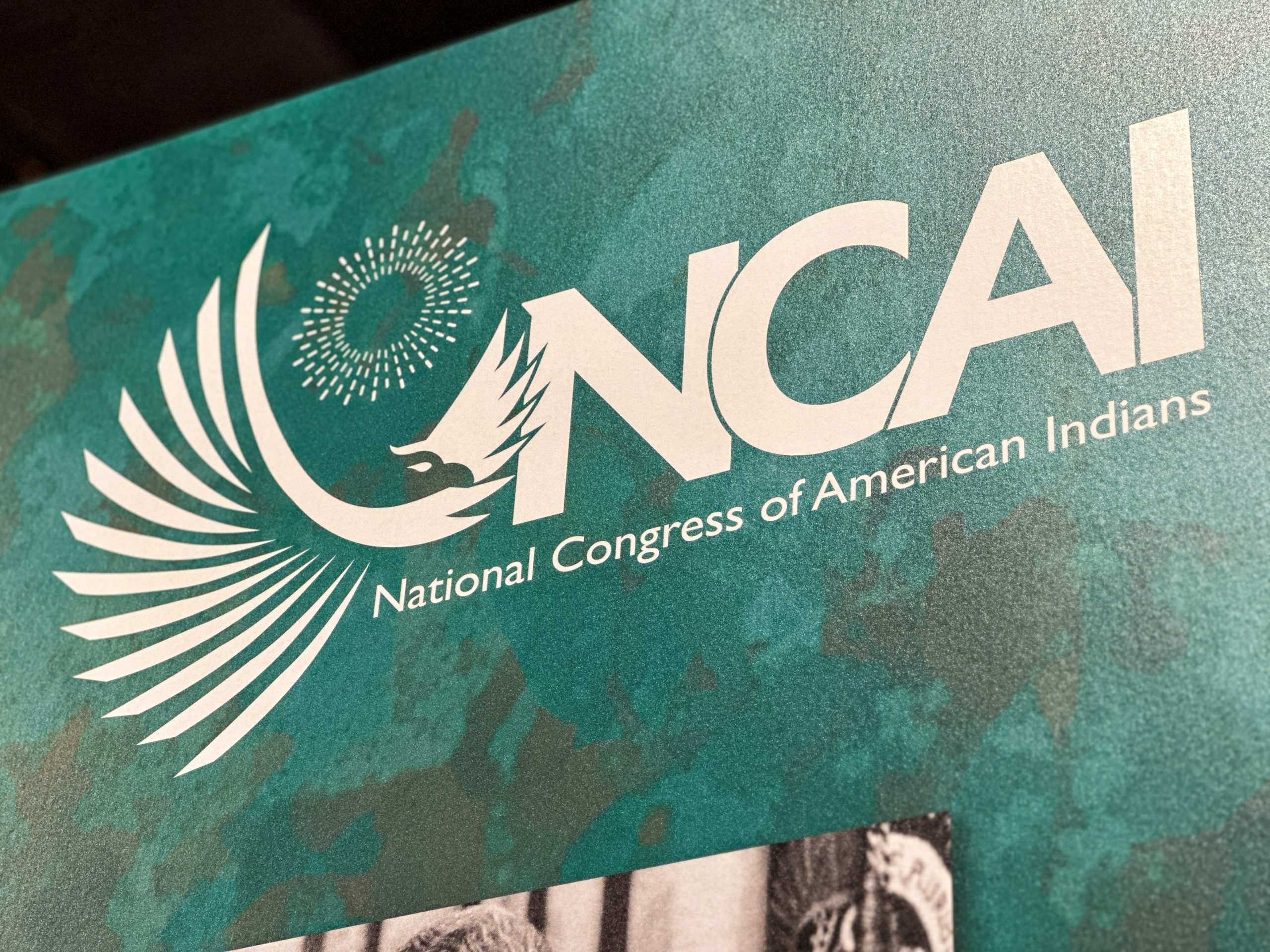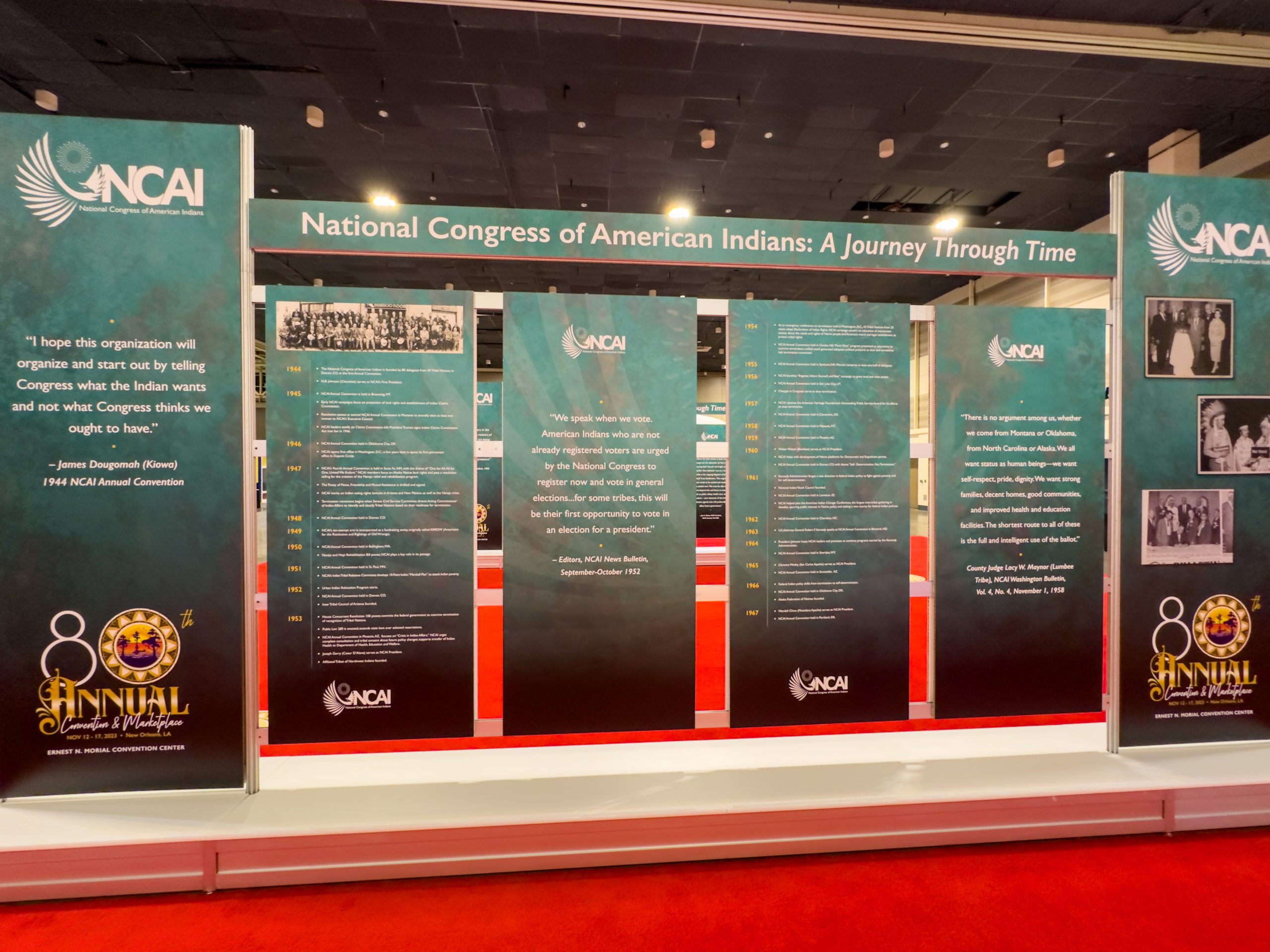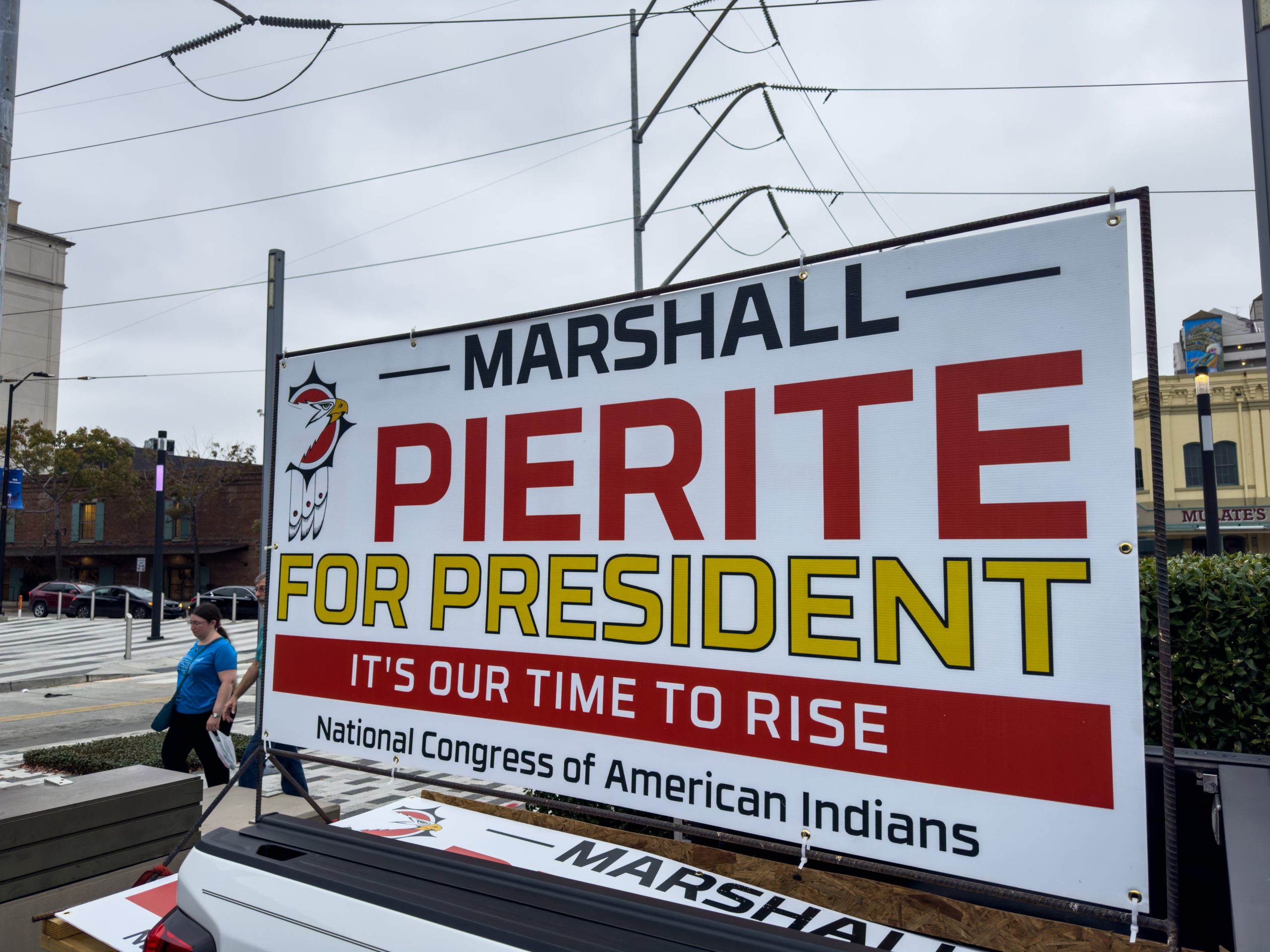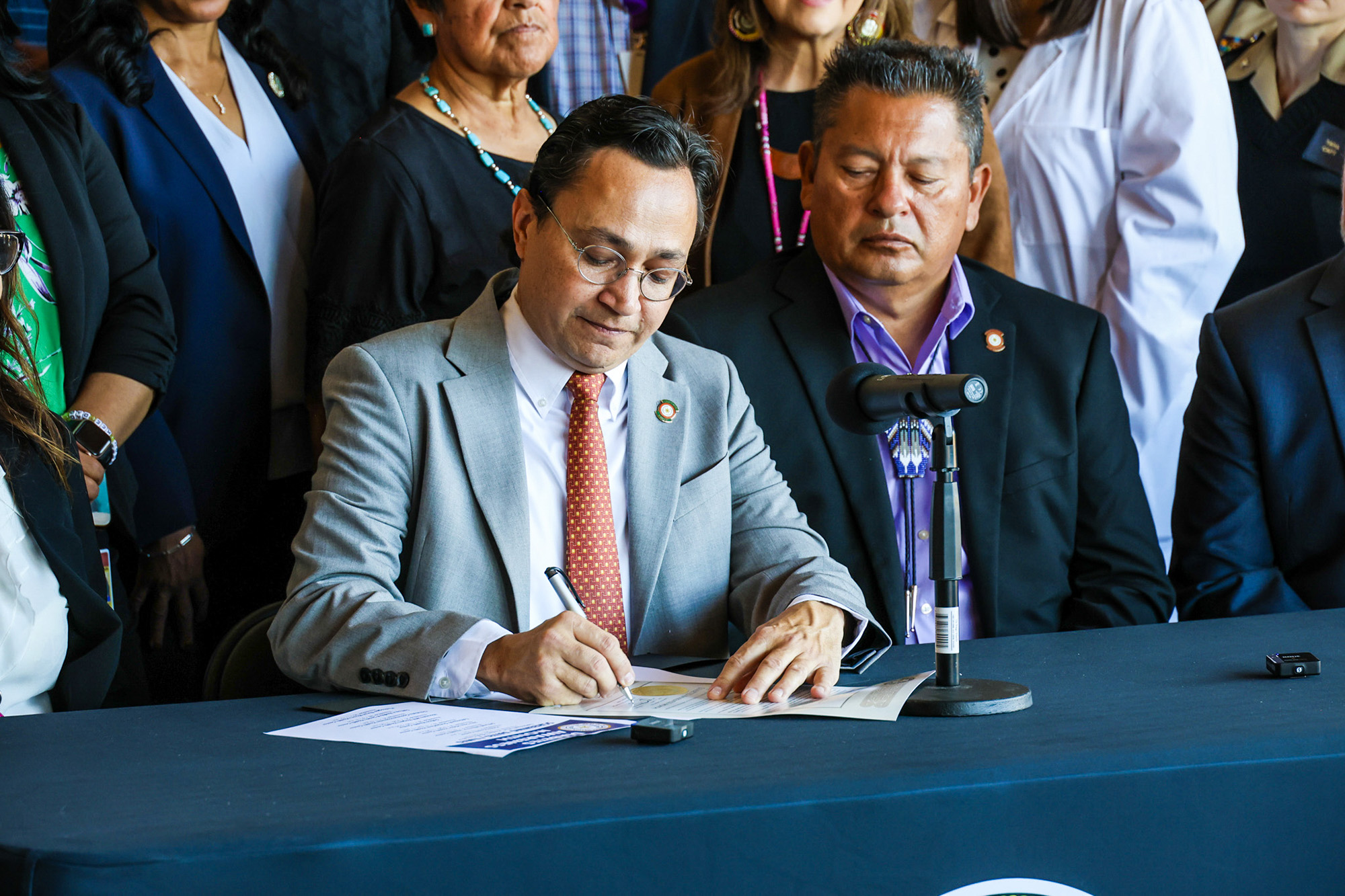Indianz.Com > News > National Congress of American Indians kicks off milestone convention

National Congress of American Indians kicks off milestone convention
Monday, November 13, 2023
Indianz.Com
NEW ORLEANS, Louisiana —
The nation’s largest inter-tribal advocacy organization is hosting a milestone meeting here this week, and one controversial topic is already generating significant debate among attendees.
The National Congress of American Indians (NCAI) heads into its 80th annual convention with a celebration of its storied legacy. A museum-style exhibit at the Ernest N. Morial Convention Center in Louisiana’s largest city highlights the many ways in which the organization has been at the forefront of protecting and promoting tribal sovereignty and self-determination since 1944.
“Today, after nearly 80 years on the frontlines of policymaking, standing at the side of our partners, we don’t just have a seat at the table,” NCAI President Fawn Sharp says in the exhibit on the convention floor in New Orleans, “we have influence and representation across the federal government, across the United States, and around the world.”
But the organization’s stature is being tested as attendees consider a controversial update to NCAI’s constitution. Some tribes are seeking to restrict membership to federally recognized tribes — reversing a long-standing policy in which groups with state recognition have been active participants in shaping Indian affairs at the national level. “If this passes, it would be a major setback in our representation and our advocacy in Indian Country,” Chief Harry Wallace of the Unkechaug Nation, a state-recognized tribe in New York, told Indianz.Com ahead of the opening of NCAI’s convention on Monday morning. Wallace isn’t alone in opposing the proposed changes to NCAI’s governing document. Brian Cladoosby — a past president of the organization — called on attendees to reject the constitutional amendments in a statement on Sunday, pointing out that tribes have already been forfeiting their seat at the table by withdrawing from membership in NCAI. “The exclusion of state recognized tribes would only further weaken NCAI and make the organization’s governance more difficult,” said Cladoosby, a citizen of the Swinomish Indian Tribal Community who served two terms as NCAI president. “We cannot afford this self-inflicted wound. We cannot and should not do the bidding of the federal government.”📍 We've made it to New Orleans!
— National Congress of American Indians (@NCAI1944) November 11, 2023
The NCAI Southeast Region Local Planning Committee, NCAI staff, and countless volunteers gathered today to help prepare and pack #NCAI80 bags for the more than 2,000 attendees expected to arrive next week.
➡️ Register at https://t.co/C2oXjjPjoe! pic.twitter.com/CM4lKCJjnB


Brian Cladoosby Statement – November 12, 2023
Relatives, we must oppose the proposed NCAI constitutional amendments to exclude state recognized Tribes from voting membership. The issue of state recognition is not a national issue; it is not an NCAI issue. That issue must be addressed at the local, inter-Tribal level. The amendments threaten to weaken NCAI by lowering our membership numbers. Already down from 270 to 145 member Tribes, it has been difficult for NCAI to achieve a quorum in recent years. The exclusion of state recognized Tribes would only further weaken NCAI and make the organization’s governance more difficult. We cannot afford this self-inflicted wound. We cannot and should not do the bidding of the federal government. Please vote against the proposed amendments.— Brian Cladoosby (Spee-Pots), 21st NCAI President, 2013-2017
Related Stories
Search
Filed Under
Tags
More Headlines
AUDIO: Legislative Hearing to receive testimony on S.4444, S.4633, S.4643, S.4705 & S.4998
VIDEO: Legislative Hearing to receive testimony on S.4444, S.4633, S.4643, S.4705 & S.4998
VIDEO: Business Meeting to consider S.465, S. 2908 & S.4370
AUDIO: Business Meeting to consider S.465, S. 2908 & S.4370
Native America Calling: Tribes addressing the ‘forever chemical’ problem
Senate Committee on Indian Affairs takes up water rights at legislative hearing
Senate Committee on Indian Affairs schedules business meeting
Montana Free Press: ‘White farmers’ ad airs amid racial baiting in U.S. Senate race
Cronkite News: Navajo Nation rallies at U.S. Capitol for radiation compensation
Native America Calling: Turning athletics into academic success
Daily Montanan: U.S. Senate candidate sidesteps questions about ‘drunk’ Indians
Cronkite News: Navajo Nation asserts authority over uranium shipments
NAFOA: 5 Things You Need to Know this Week
Chuck Hoskin: Cherokee Nation asserts sovereignty over our health
Native America Calling: Balanced lessons on missions and the gold rush in California
More Headlines
VIDEO: Legislative Hearing to receive testimony on S.4444, S.4633, S.4643, S.4705 & S.4998
VIDEO: Business Meeting to consider S.465, S. 2908 & S.4370
AUDIO: Business Meeting to consider S.465, S. 2908 & S.4370
Native America Calling: Tribes addressing the ‘forever chemical’ problem
Senate Committee on Indian Affairs takes up water rights at legislative hearing
Senate Committee on Indian Affairs schedules business meeting
Montana Free Press: ‘White farmers’ ad airs amid racial baiting in U.S. Senate race
Cronkite News: Navajo Nation rallies at U.S. Capitol for radiation compensation
Native America Calling: Turning athletics into academic success
Daily Montanan: U.S. Senate candidate sidesteps questions about ‘drunk’ Indians
Cronkite News: Navajo Nation asserts authority over uranium shipments
NAFOA: 5 Things You Need to Know this Week
Chuck Hoskin: Cherokee Nation asserts sovereignty over our health
Native America Calling: Balanced lessons on missions and the gold rush in California
More Headlines
